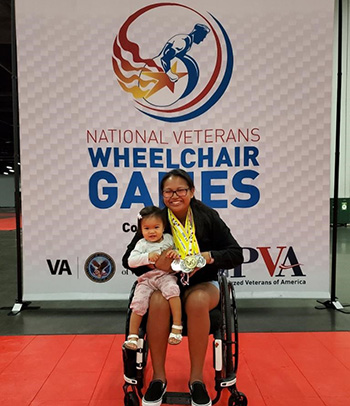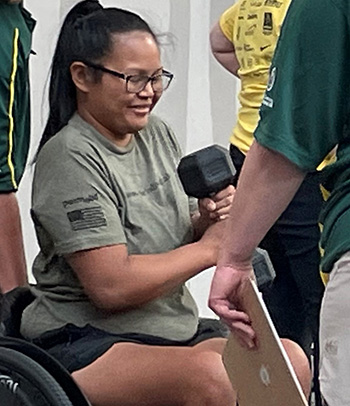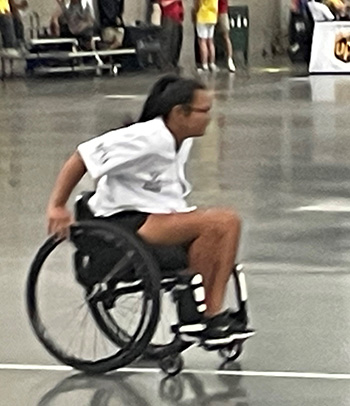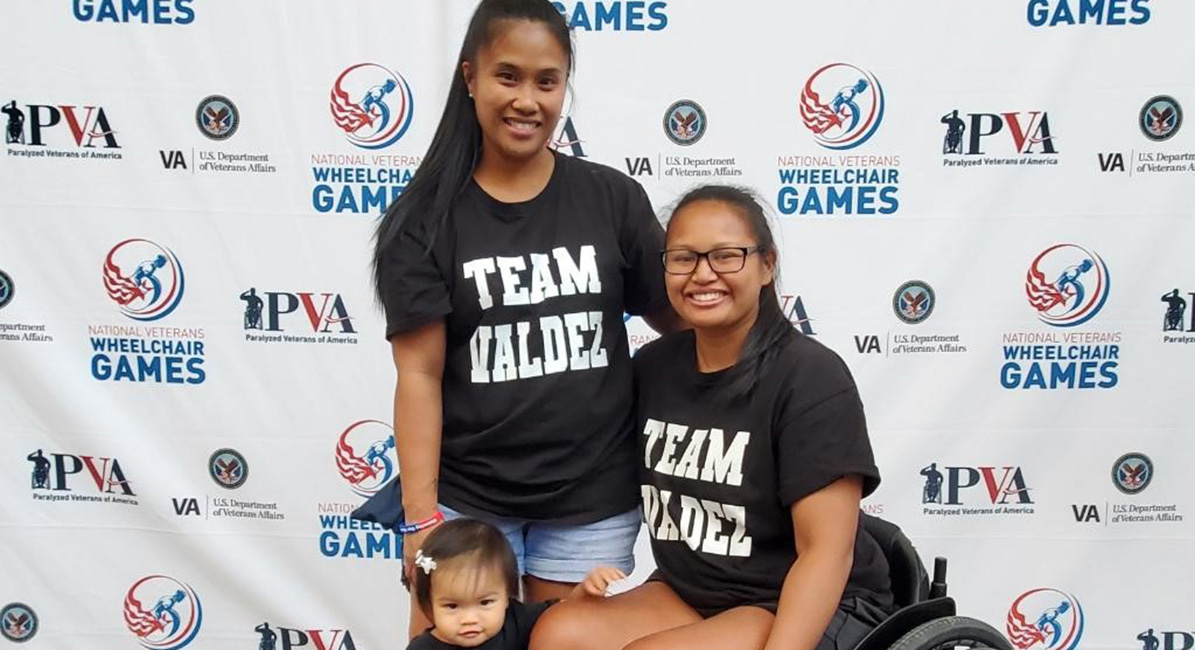Despite the dramatic physical, emotional and mental change in her life, Ipo has overcome challenges, and her health is strong. Even more, her need for ongoing care is inspiringly positive.
 Every participant at the National Veterans Wheelchair Games in Portland, Ore., July 4-9, arrived through a different journey, but the light in each to compete and enjoy special camaraderie with fellow Veterans glowed bright.
Every participant at the National Veterans Wheelchair Games in Portland, Ore., July 4-9, arrived through a different journey, but the light in each to compete and enjoy special camaraderie with fellow Veterans glowed bright.
Ipo Valdez, 33, of Ewa Beach (O’ahu), Hawaii, a former U.S. Army combat medic and proud mother of an infant daughter, is one example of the competitive fire and inspiring light that was evident at the games.
In 2009, Ipo was serving at U.S. Army Garrison Humphreys, South Korea, her first duty station as a combat medic. She had joined the Army in 2008, a year after graduating high school and completing one year of college.
She completed her 10-week Army Basic Training and followed with successfully completing 16-weeks of Combat Medical Specialist Training to prepare for her permanent duty role. She then thrived in her assignment with the 8th Army MEDCOM.
But within months, Ipo’s military service and life dramatically changed. About six months into her tour, she began to “have headaches for a while, maybe a month,” she said. She also began feeling “less active and tired,” she added.
 As a proud Army go-getter and very busy at the time, she was uncertain if her symptoms were unusual. “I was a shift leader in the ER and also picking up shifts, plus our daily PT,” she said. “I didn’t know if my body was rested enough.”
As a proud Army go-getter and very busy at the time, she was uncertain if her symptoms were unusual. “I was a shift leader in the ER and also picking up shifts, plus our daily PT,” she said. “I didn’t know if my body was rested enough.”
As her symptoms persisted and worsened, she finally reported to her unit squad leader that she wasn’t well. Something was wrong, but as a busy soldier she didn’t know it was more serious than fatigue.
“I recall that I was ‘put in quarters’ to rest and recover,” she said, “but later my unit called to check on me and I didn’t respond from my barracks. They realized they needed to send someone to check on me, and when they went in I had completely collapsed.”
Ipo doesn’t remember her collapse. “All I know is that I didn’t answer from the room,” she recalled.
Ipo was immediately hospitalized and she was soon diagnosed with an unusual meningitis infection that inflames the tissues protecting the brain and spinal cord.
Life-Saving Intervention
Certain types of meningitis can resolve on their own. But Ipo’s case had become spinal meningitis, a life-threatening infection that would require a medically induced coma to save her life.
“I told my grandmother I had not been feeling well, and the next communication they received from the Army was that she and my brother had to fly to Korea right away because I was going to be put in a coma,” she shared.
The coma suppressed her brain and body activity, with hopes of preserving her brain and spinal cord from damage. With Ipo’s rapidly spreading spinal meningitis case, the infection had already caused life-changing impact.
“I was in a coma for a week,” she said, “and all they could really do was let the virus take its course. Afterward, I was paralyzed from the waist down,” Ipo shared.
“The inflammation caused a spinal cord injury, making my spine incomplete,” she explained. “I have some sensation, but no longer have full sensation or range of motion.”
Following initial recovery from the coma and recognition of her paralysis, Ipo’s tour in Korea suddenly ended. Two weeks later, the Army medically evacuated her to Tripler Army Medical Center in Honolulu.
After another month of observation at Tripler, a medical slot opened up at the Palo Alto VA Medical Center in California. For six months she was treated in the Polytrauma Rehabilitation Program (PTRP), receiving intensive rehabilitative care for her injuries to multiple organ systems.
Ipo then returned to Hawaii for about a month. “And then I went back to Palo Alto VA for another eight months of rehabilitation,” she added.
After her stay, she was officially medically retired from the Army, a little more than three years into Active Duty.
“At first it was very hard not to be mad why I got the virus,” she said. “It was a long time after my injury that I still had resentment about why it was me,” she shared. “I was 20 years old with a little over a year of active service at the time, and just a few months into my first duty station.”
Her doctors still don’t know how she got meningitis. “They think it’s possible it could have been an insect bite. No one else in my unit got it,” she added.
Her rehabilitation wasn’t the only new challenge Ipo faced. The severe inflammation had damaged brain tissue, causing memory lapses.
“My memory is very bad and my wife Serina has had to be a witness to everything that has happened since,” Ipo said.
Overcoming and Rehabilitating
 Despite the dramatic physical, emotional and mental change in her life, Ipo has overcome challenges, and her health is strong. Even more, her need for ongoing care is inspiringly positive.
Despite the dramatic physical, emotional and mental change in her life, Ipo has overcome challenges, and her health is strong. Even more, her need for ongoing care is inspiringly positive.
Today, she uses her local VA hospital for care and also VA’s Community Care Network (CCN) when necessary. Hawaii is in VA’s CCN Region 4, which is covered by TriWest Healthcare Alliance (TriWest).
“I usually get my health care from VA, but when VA doesn’t have the services I need, I use TriWest,” she said. “Overall, I’ve been satisfied with VA care and don’t have any complaints.”
She is similarly positive with her TriWest CCN needs. “I always get what I need when I need it,” she explained.
Her most important base of support comes from home where Serina and one-year-old daughter Charlie Belle are her focus.
They joined her at the Wheelchair Games where she competed in pickleball, powerlifting, softball, adaptive fitness, slalom, bowling and table tennis. She feels fortunate they were there in support of her rehabilitation and her inspirational perspective.
“Now I feel I have many blessings,” she said with her family nearby. “I’d rather it would be me than someone else with much less support,” she emphasized.







